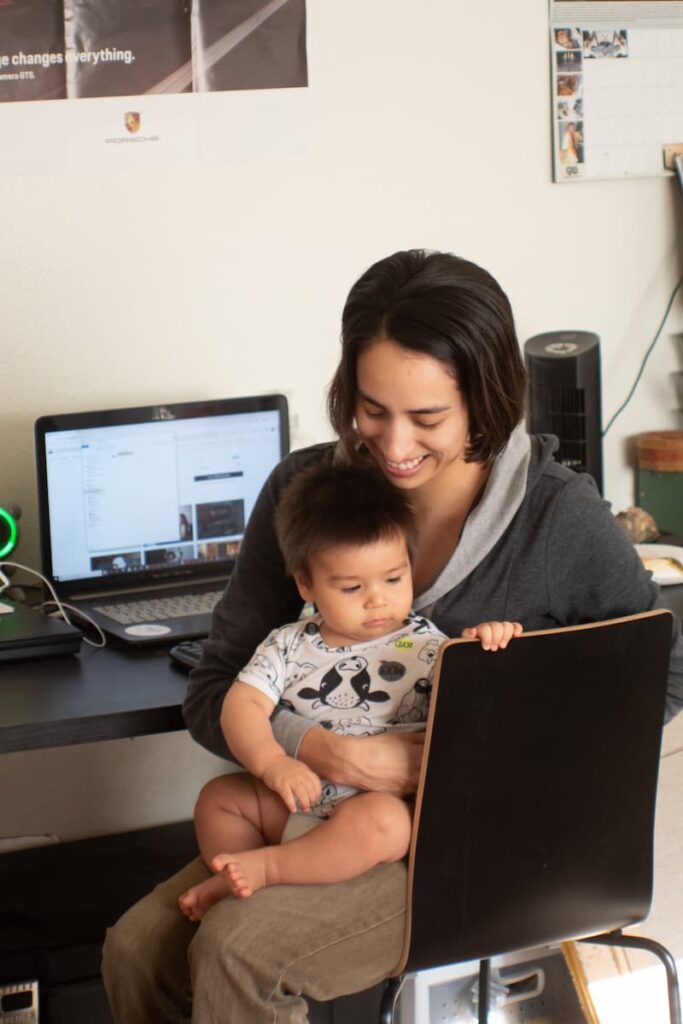Disclosure: Articles may contain affiliate links. As an Amazon Associate, we earn from qualifying purchases (at no additional cost to you). See our full disclosure here.
Last updated on October 24th, 2023 at 11:58 am
So, you’ve decided to go back to college after having children. You’re likely a little worried about the prospect of juggling your studies and life at home, but you’re excited for all the opportunities that await you once you graduate. Sound familiar? If so, money is most likely one of your biggest stressors, and that’s understandable. Your resources are already stretched thin, and college tuition and fees don’t come cheap.
Being a student and a mom is tough on any budget, so let’s talk about some ways to reduce expenses and save money.

How to Save Money While Being a Student and a Mom
1. Stick to a Budget
There are a few key things to remember when creating a budget as a student mom. First, be honest with yourself about how much you earn, how much you have in the bank, and what you can afford.
Don’t try to live beyond your means, as the numbers don’t lie. It’s important to be disciplined when it comes to budgeting since it’s so easy to get off track.
Think about using a budget app (or another method that’s easy for you) to track your spending and record your income. You always want to know exactly how much money is coming in and going out of your accounts. This is the simplest way to see where you can cut unnecessary spending.
2. Refinance Your Student Loan
Keeping more of your money by refinancing student loans is a popular option with moms who are returning to college as adult learners.
Refinancing means lower interest rates and, in the majority of cases, better repayment terms. And, it’s an ideal option for those who want to pay less over more time in the hope of reducing monthly expenses.

3. Cook Cheap, Healthy, and Easy Recipes at Home
Being a student and a mom mean that time and money are going to be limited so look for ways to make easy, inexpensive meals at home. You’ll save so much money versus grabbing take-out, and you can eat much healthier at home than if you’re always hitting the drive-thru.
Investing in a slow cooker may be a good option since you can make freezer meals in advance, and start the slow cooker before you go to class in the morning. An air fryer is another great appliance as it guarantees to cut your cooking time considerably.
In terms of ingredients, always try to use fresh, natural ingredients as much as possible, and don’t be tempted by chemical-rich processed foods.
Cutting back on meat and substituting protein-rich beans, chickpeas, and lentils is a money-saver too. Once you get the hang of it, you can make tasty dishes using cheap-ish and healthy ingredients.
4. Find Affordable Housing
I know this might be easier said than done, and finding affordable housing can be a daunting task! But, in many places, it is possible if you put in the effort.
Start by looking online, and see what options are available. Next, contact your local government or housing authority as they may be able to give you advice and assistance.
If you fall into the low-income family guidelines, there may be some local organizations that can guide you. There are often apartments in newer, well-run apartment complexes that may be available at a reduced cost with housing vouchers, for example. Even if there’s a waiting list, it doesn’t hurt to get your name listed.
5. Childcare
When you need affordable child-care, you may want to start your search with family and friends. Talk to your nearest and dearest and see if they’re able to help you out.
If a relative can watch the kids even one day per week, that will make a tremendous difference over time. If you’re not successful in finding someone close to home, contact your local YMCA or community center as they normally run affordable child care programs.
And, of course, check with your school. Many of them run childcare centers on campus.
If all else fails, think about getting your friends together to start a babysitting co-op. This can be a terrific way to save money on childcare costs while also getting some quality time with your little one.
6. Other miscellaneous tips to save money while being a student and a mom:
- Rent your text books instead of buying them. If you do buy books, sell them online when the semester’s over.
- Shop where student discounts are offered.
- Pack your lunch if you’ll be eating on campus, and take along a water bottle or your morning coffee, so you don’t have to buy one.
- Always use your grocery store loyalty card to get discounts on food and household items.
- Plan your menus to take advantage of grocery store sales and less expensive in-season produce.
- Clip coupons from newspapers and online coupon websites.
- Cut out expensive cable packages or streaming services, especially if don’t use them often.
- Always comparison shop before making a purchase.
- Consider joining a warehouse club with a family member to take advantage of bulk savings.
- Purchase store brand products instead of name brand products whenever possible.
- Take advantage of free activities on campus and in your community, such as museum days, park days, and festivals.
- Check out our freebies list for more ideas.
Have you been a student and a mom at the same time? Share your money-saving hacks in the comments below.
How to Save Money While Being a Student and a Mom: 6 Tips | #personalfinance #family Click To TweetAlso read:
Get Your Truly FREE Credit Report and Credit Score Online
How to Save for a Rainy Day: Try These 5 Smart Saving Strategies
You can find MomsWhoSave on Facebook, Instagram, Pinterest, and Twitter. Join us for updates!
Leave a Reply